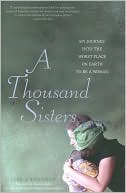

 |

|

The average rating for A Thousand Sisters: My Journey into the Worst Place on Earth to Be a Woman based on 2 reviews is 2.5 stars.
Review # 1 was written on 2011-10-23 00:00:00 Jeffrey Berezinski Jeffrey BerezinskiI have difficulty reading memoirs of Western women experiencing the reality of violence in the global South. I have no right to say this, mind you. I am a Western woman...a white woman on top of that. I tread lightly in what I am about to say, mainly because I know that I could be labeled a hypocrite. With that danger in mind, I will proceed to trumpet the efforts and determination of Congolese women. I have been to the eastern Kivu provinces and while I learned much, what I learned most of all is that Western women need to stop depicting Congolese women as victims. Shannon's account does bring out the strength of women...but not the strength that shows that Congolese women are organized, they do fight against what is happening, they do rescue each other, they are capable of running NGO's, hospitals, schools, food pantries...all without manipulating and asking for money in a constant stream as Shannon writes. I want to scream at the top of my lungs to Eve Ensler, Alice Walker, and others to STOP!!!!!!! Congolese women have always been politically active and committedly strong throughout the country's long history of adversity. There are AMAZING grassroots women's organizations that are struggling to compete with Shannon, Oxfam, Doctors Without Borders, and other Western-run, international orgs for money. The DRC is the country of the Congolese...they insist they have the knowledge and the ability to stop the war and rebuild. That is the story I want to hear. I want to hear about the Congolese women in Portland, Oregon (THEY ARE THERE, I HAVE SPOKEN WITH THEM, THEY HAVE ORGANIZED TO HELP THEIR FRIENDS AND FAMILY BACK HOME), who have organized to run a marathon to send money to the DRC - not Shannon. Strangely, Congolese organizations in the U.S. are never heard from. Perplexing to say the least. |
Review # 2 was written on 2011-06-19 00:00:00 John Clark John ClarkI'm...fairly conflicted about this book, but I think most of my issues stem from the writing style and its deficiencies--I'm hoping some things just don't come across in the reading. I should start by saying that I think this is an excellent book for an introduction to the atrocities of the Congo if you're still uninformed. It is a huge, horrific problem that has not garnered nearly enough international attention and help (perhaps because the Congo isn't known for its oil surplus?). In many respects, this is an eye-opening and necessary read, and it should also be said that, despite my issues with her, Lisa Shannon was an advocate for the Congo when almost no one else was, and she should be commended for her pioneering work. Having said that, the tone of this memoir is often off-puting. Lisa goes to the Congo intent on bonding with her sponsored "sisters," and is otherwise unprepared for the reality of abject poverty and systematic rape, torture, and murder. She writes as if completely unaware of her privilege as a white woman from the United States--she is put off by the Congolese women's constant asking for more money and treating her like a muzunga (essentially a well-off white person who can help them), wanting to really revel in her Oprah moment of sharing and crying with them. It comes off incredibly narcissistic and naive. And never mind that despite hating being treated like a muzunga, she constantly acts like one--bringing money and trinkets to every village (a welcomed act, it should be noted, but certainly one that marks her as a fount of giving), intervening in a mother's decision to listen to her child's doctors when they say there is nothing else to do for him (again, heartwarming in the end, but smacks of the "I'm the white, civilized person here and I know what's best for you.), etc. The most appalling anecdote to me was when she received a village gift of a goat--Shannon is a vegetarian herself (again, a choice she is able to make because of privilege) and does not want to eat the goat, but is touched by the gesture, considering how expensive the animal must have been. The villagers expect her to appreciate the goat and want to have a celebratory feast. Shannon, in an act of what she tries to pass off as selflessness, gifts the goat to the village. She then, in an oblivious act of privilege, tells the villagers that this goat is special, and that they are never to eat it. Now clearly, as a vegetarian, the thought of killing an animal for any purpose is certain to make her squeamish. But she had just marveled at the poor villagers' generosity, knowing full well how long someone has to work to buy a goat, and then had the AUDACITY to proclaim that she, as a Very Important White Girl, deems this goat sacred, and they can never ever ever put it to its sorely needed use, even when she's long gone and back in her comfortable, air conditioned house in Portland? If you're not tasting bile by this point, I'm surprised. So, all in all, I suppose I can recommend the book as long as you take it with a hefty pinch of salt and are prepared to deal with the short-sightedness of the author. |
CAN'T FIND WHAT YOU'RE LOOKING FOR? CLICK HERE!!!